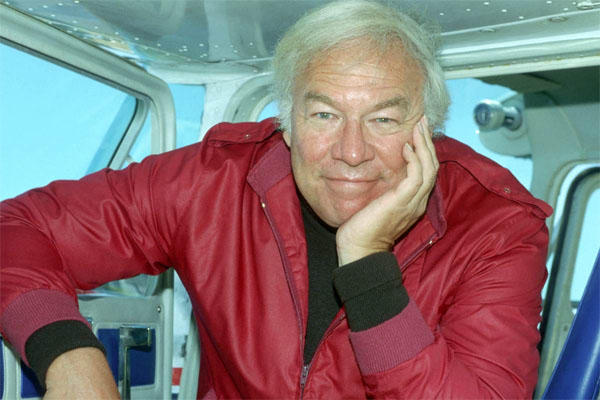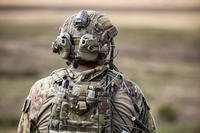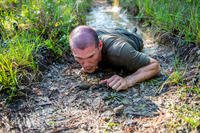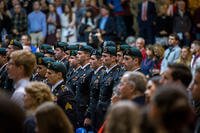In a career spanning five decades, George Kennedy was one of the most reliable character actors around, making his mark in dozens of TV shows and just about every type of movie genre you can name. What many don't know is that he also had a long and distinguished career in the U.S. Army before he joined the acting ranks.
Kennedy was born into a New York show business family on February 18, 1925 and got the showbiz bug from an early age -- he first appeared on stage at age two and later moved into radio. During World War II Kennedy enlisted in the Army as soon as he turned 18. He opted for the Army Air Corps, but as he would later reminisce, such a choice did not come without challenges: "I'm six-foot-four, and even in those days I weighed 210 pounds. I was interested in airplanes then, and I'm interested in airplanes now. The best explanation came from a master sergeant in the Air Force. He said, 'George, there's nothing wrong with you. But we can either put you in an airplane or we can put a 200-pound bomb in an airplane. We'd rather put the bomb in the airplane.'"
Kennedy would serve the Army for 16 years, eventually attaining the rank of Captain. True to his radio roots, he became a disc jockey on Armed Forces Radio, and helped establish the Army Information Office, which provided technical service to the film and television industries. Serving during World War II was no picnic; Kennedy was under the command of General George Patton, and he would later reflect, "Kids who had never done anything more dangerous than play kickball in the street were shooting BAR's and mortars and killing each other... The war was one horrendous surprise after another. I can't think of anything I did during the war that did not involve death."
From War to the Oscar
A back injury would end Kennedy's military career in the late '50s, but his showbiz connections from his time in service helped prepare him for the transition to an acting career. While serving as technical advisor for the "Phil Silvers Show" (CBS, 1955-59), Kennedy had made infrequent, uncredited appearances on the program, which encouraged him to take on supporting roles on numerous TV series -- usually as a tough cowboy, outlaw or lawman. His big-screen debut came in Stanley Kubrick's classic "Spartacus" (1960) as a rebelling soldier, and soon he moved on to other high-profile projects, such as "Charade" (1963) with Cary Grant and Audrey Hepburn. His other prominent roles during this period came in the air disaster drama "Flight of the Phoenix" (1966) and as an Army major in the classic Lee Marvin war thriller "The Dirty Dozen" (1967).
The role of Kennedy's career would come soon after in "Cool Hand Luke" (1967), starring opposite Paul Newman. As a bullying convict who is won over to fellow convict Newman's side, the performance would earn Kennedy an Oscar for Best Supporting Actor. From then on, Kennedy was in constant demand, and in the '70s he was equally at home in tense thrillers ("The Boston Strangler" (1968)) as he was among star-studded casts, such as in "Death on the Nile" (1978) and in the "Airport" movie series, including a starring role in "The Concorde: Airport '79" (1979). Kennedy would also find work in the movies of fellow veteran Clint Eastwood, including the baddie in "Thunderbolt and Lightfoot" (1973) and as an ally in "The Eiger Sanction" (1975). He found steady work in television as well, starring as a beat cop on the TV series "The Blue Knight" (CBS, 1975-76).
Kennedy's career had its share of ups and downs in the late '70s and throughout the '80s, as he could only find roles in low-budget, low-return B movies, but he found a niche in respectable television series. He appeared frequently on "Dallas" (CBS, 1978-1991) as a rival against Larry Hagman's J.R. Ewing, and also appeared in well-reviewed TV movies such as "The Jesse Owens Story" (1984) and "Backstairs at the White House" (1979). A younger generation of viewers would discover his talents through the "Naked Gun" movies in the late '80s and early '90s, which parodied many of the serious cop dramas Kennedy had excelled in earlier in his career. Playing ultra-earnest, somewhat dim Captain Ed Hocken, Kennedy managed to poke fun at his image as well as prove he still had the acting shops.
In addition to his acting roles, Kennedy was the author of two mystery novels set in Hollywood, Murder on Location (1981) and Murder on High (1984), and wrote a well-reviewed memoir of his life in 2011, Trust Me: A Memoir. In the preface to the memoir, he summed up his style (and his approach to life) with the following: "I write like I talk. A long time ago I tried making 'talking and telling the truth' one and the same. That isn't just difficult; it means painfully reviewing things you've been led to believe since you were a child. That's very hard to do. Like many, I have marched along adhering to conventions (sex, color, church, party, gang) without examination. There's a wonderful, protective 'togetherness' in that anonymity. You obey or are damned, less joined together than stuck together. You become an echo rather than a voice. This book is about what happens when you stop fearing and think."
George Kennedy passed away on February 29, 2016 in Middleton, Idaho, where he had spent his final few quiet decades of retirement.
















